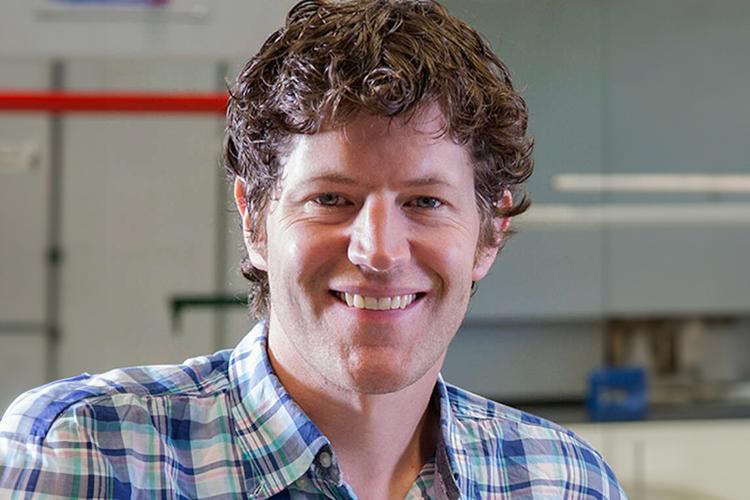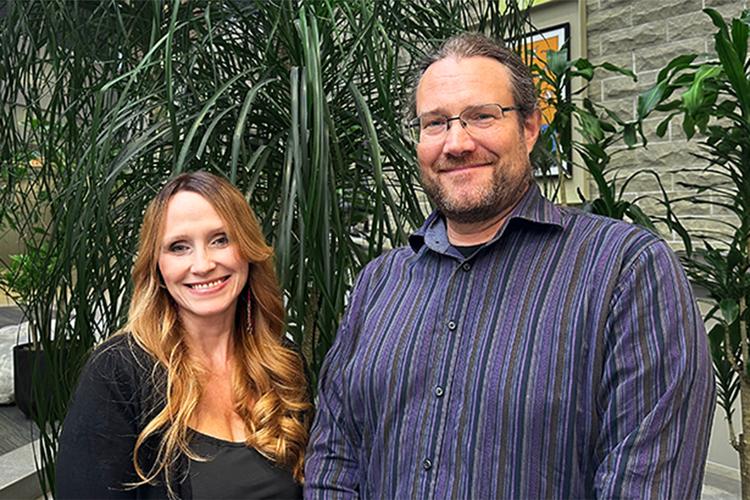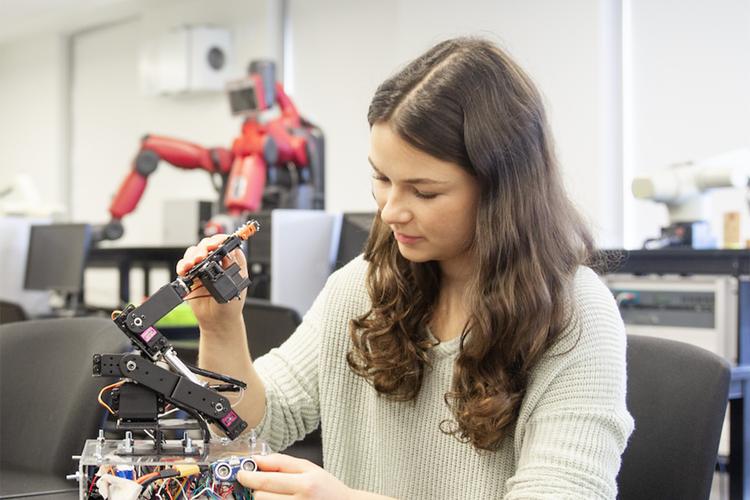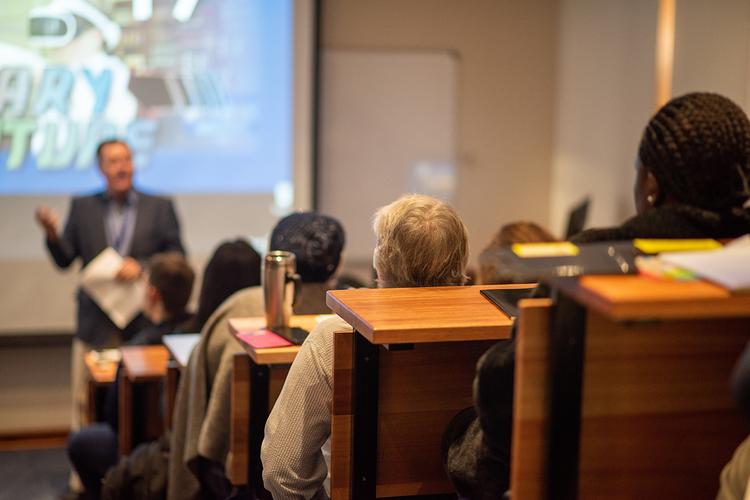Strategic Plan 2023-2024 Achievements
Deepening Our Impact on the World

Canada Excellence Research Chair
Dr. David McCarthy’s appointment as the Canada Excellence Research Chair (CERC) in Waterborne Pathogens, further strengthens the University of Guelph's reputation as a research leader. Both an incredible achievement and an historic first for the University of Guelph, hosting a CERC reinforces our leadership in One Health while propelling us to new heights in research, innovation, and outreach. Supported by $8 million in federal funding, this highly regarded award enables our researchers to tackle the most complex health challenges through cutting-edge research and interdisciplinary collaboration.

International Partnerships
Strategic partnerships with the University of Reims Champagne-Ardenne, AgroParisTech, and INRAE are expanding the University of Guelph’s research and educational reach in Europe. With multiple MOUs underway these collaborations grow the U of G’s presence in France creating deeper connections and increased opportunities for impactful research and academic exchange.

Global Thought Leader in Residence
Launched in partnership with the Canada India Foundation, the Global Thought Leader in Residence program is strengthening the University of Guelph’s global impact by fostering deeper Canada-India ties by hosting figures like Vikas Swarup, former Indian High Commissioner to Canada. This initiative allows us to build powerful connections that enrich the University community and position U of G as a leader in global engagement and partnership.

Benjamin Franklin Medal
Dr. Paul Hebert receiving the highly prestigious 2024 Benjamin Franklin Medal for Earth and Environmental Science for his ground-breaking DNA Barcoding technology reinforces the University of Guelph's reputation as global leader in higher education and research.
Known as "the father of DNA barcoding," Dr. Hebert's pioneering species identification technology has revolutionized biodiversity research. Dr. Hebert’s leadership at the Centre for Biodiversity Genomics (CBG) and his role in a global network of 1,000 researchers across 41 countries underscore the University's commitment to impactful, world-changing science.
Transforming Our University Through I-EDI

Black and Indigenous Hiring Initiative
The University of Guelph's Black and Indigenous Hiring Initiative (BIHI) is driving transformative change across campus by working to recruit a diverse faculty and staff body. With 17 positions already filled – 11 faculty and six staff – and one search underway, the initiative is making substantial progress toward its goal of hiring 15 faculty and four staff by 2025. By addressing underrepresentation and closing the racial equity gap, U of G is helping to support the personal, professional, and scholarly goals of its diverse community.

Waasamowin Atrium Naming and Art Installation
Driven by the leadership of Drs. Melissa Perreault and Ryan Gregory the Summerlee Science Complex (SSC) atrium at the University now proudly bears the name “Waasamowin” (Wah-sah-mow-in), an Anishinaabemowin word meaning “to be bathed in light.” This renaming reflects the atrium’s unique features—a tall, bright space flooded with natural daylight and adorned with lush foliage. Anishinaabe Elder Rene Meshake, along with Drs. Perreault and Gregory, chose this name to honor Indigenous culture and create a comfortable and welcoming environment. Additionally, the atrium showcases four original works of art by First Nations and Métis artists, fostering a space where Indigenous and non-Indigenous individuals can learn and connect. This is an important step for the University of Guelph to fulfill its commitment to advancing reconciliation and enhancing recognition and respect for Indigenous cultures.

Open Doors Program Launch
The University of Guelph’s Open Doors Program is advancing equitable access to education and promoting diversity through supports for Indigenous and Black undergraduate students in academic research. Offering a $1,000 stipend for faculty-guided projects, the program enhances research opportunities, preparing students for advanced studies and boosting their competitiveness for graduate programs. Those pursuing a Master’s degree at U of G will receive a $2,500 Open Doors Entrance Scholarship, further supporting their academic growth.

Creating Opportunities for Racial Equity
The University of Guelph’s Creating Opportunities for Racial Equity (CORE) programs advance equitable success by connecting Black and racialized students with peers and mentors. The CORE Peer Program supports first-year students in transitioning to university life, while the CORE Mentorship Program pairs upper-year students with professionals to build connections and networks. These initiatives create a supportive community, enhance academic and personal growth, and foster lasting, impactful relationships.
Advancing U of G’s Distinctive Student Experience That Fuels Success and Future Impact

President’s Co-op Program
U of G’s commitment to experiential learning is reflected in the expansion of on-campus co-op opportunities through the new President’s Summer Co-op Initiative. This program allows departments to hire co-op students for summer roles, with wages fully covered by the initiative. With over 5,000 students in 67 co-op programs, U of G is one of Ontario’s largest co-op universities. This initiative not only supports students in developing practical skills but also strengthens U of G’s position as a leader in providing high-quality experiential learning, equipping students with valuable experience for their future careers.

Curricular Innovation and New Degree Programs
U of G’s dedication to curricular innovation is evident in the enhancement of existing programs and the introduction of new degrees, including the Bachelor of Mathematics and Bachelor of Creative Arts, Health and Wellness, which launched in Fall 2024. By aligning academic offerings with evolving industry demands and societal needs, U of G ensures students gain cutting-edge knowledge and skills essential for success in a rapidly changing world. The new Bachelor of Engineering in Mechatronics Engineering further strengthens U of G’s impact in STEM fields, preparing future-ready graduates for high-demand careers and reinforcing the University’s commitment to student success.

Student Mental Health Task Force Report
The Task Force on Student Mental Health engaged over 2,600 members of U of G’s community to develop 40 key recommendations aimed at transforming the University's approach to student mental health. These recommendations focus on enhancing institutional structures, fostering a supportive campus climate, promoting mental health awareness, and improving services and accessibility. By implementing these targeted strategies, U of G is not only addressing current mental health challenges but also positioning itself as a leader in providing comprehensive, innovative mental health support to students, ensuring their well-being and success in an evolving academic environment.
Building a Sustainable Tomorrow

Sustainability Action Planning
The Net Zero Carbon Climate Action Plan Steering Committee is driving U of G’s strategic approach to achieve net-zero carbon emissions by 2040. Complementing this, the Zero-Carbon Energy Conservation and Demand Management Plan is being developed to reduce energy consumption and carbon emissions. These initiatives are essential for transforming our campuses into living labs, demonstrating our commitment to sustainability and achieving a net-zero future.

OAC Research is Creating a More Sustainable Agri-Food System
National and international projects being co-led by Ontario Agricultural College (OAC) researchers aim to tackle climate-change related challenges in agri-food. One project looks at making crop production more sustainable by reducing greenhouse gas emissions in the process. Led by Dr. Claudia Wagner-Riddle, a professor in the School of Environmental Sciences, the project team is looking at alternatives to conventional fertilizer whose ammonia base consists of hydrogen and nitrogen.
While nitrogen is vital for promoting growth and crop yields, making ammonia requires fossil fuels and releases greenhouse gases, notably nitrous oxide emitted from soils due to nitrogen fertilizer application. Dr. Wagner-Riddle’s research will help farmers achieve the federally mandated target for reducing nitrogen-related emissions by 30 percent by 2030.

Arboretum’s Gene Banks and Seed Orchard Contribute to Conservation
U of G’s Arboretum was one of the first institutions to establish a living gene bank dedicated to archiving known populations of rare woody plants native to Ontario. Today, over 30 species of rare woody plants are archived in the Arboretum’s grounds and gene banks. The living gene banks aim to reduce collection pressure on small surviving threatened and endangered wild populations, increasing the ability of those populations to naturally regenerate. Recently, the Arboretum has worked with several different conservation agencies in southwestern Ontario to form a Red Mulberry Working Group with the goal of recovering the endangered species. Only 200 to 300 of the small-medium-sized understory trees are left in the province and the species is threatened by hybridization by the non-native white mulberry. As a next step, the Arboretum is propagating pure red mulberry trees to establish a long-term seed orchard.
Supporting Faculty and Staff Success

Wellness and Engagement Survey
In Winter 2024, the university completed a comprehensive wellness and engagement survey. By gathering valuable insights into faculty and staff well-being, we are working towards creating a healthier, more supportive work environment that empowers our team to thrive.

Celebrating our People
Our faculty and staff are the driving force behind the University of Guelph’s pursuit of excellence. We recognize their contributions through initiatives such as the Exemplary Staff Awards, Spring Social, and Employee Appreciation Day. Additionally, external events like the Royal Agricultural Winter Fair and Queen’s Park Day further highlight their achievements and innovative contributions to U of G and the broader community.

Learning and Development
To support faculty, research staff, and graduate students in enhancing the impact of their work, the Office of Research at U of G offered the Skills for Research Impact workshop series. Facilitated by experts, these workshops equipped 453 participants with practical strategies for effective research communication and knowledge mobilization. Another one of U of G’s standout offerings is Personal Leadership at Work. Offered through Human Resources, this program helps employees deepen their understanding of their motivations, values, and strengths, while strengthening their collaboration and teamwork skills to enhance their overall impact and satisfaction at work.
Leveraging Financial and Digital Capacity

Gryphons at Work
The new Gryphons At Work HR system marks a significant leap in U of G’s technology innovation. This cloud-based platform replaces an aging HR system, enhancing efficiency and accessibility across campus. With its modern, user-friendly interface, Gryphons at Work supports seamless, remote access through secure multi-authenticated sign-on, transforming HR into a strategic partner. This upgrade will impact all campus users—from faculty and staff to administrators—by streamlining processes and improving overall HR management. By embracing cutting-edge technology, Gryphons at Work not only modernizes our HR practices but also positions U of G at the forefront of technology-driven organizational excellence.

RAIMS
The launch of the Research Administration and Information Management System (RAIMS) the first step in the transformation of U of G's research operations. With the debut of the EthOS module in July 2024, researchers can now streamline the submission, review, and approval of human ethics applications through a modernized platform. EthOS offers dynamic form navigation, real-time application status updates, built-in communication tools, and automated notifications, enhancing efficiency and integrity in the ethical review process. This advancement significantly reduces administrative burdens, allowing researchers, ethics board members, and support staff to focus on high-value work. RAIMS represents U of G’s commitment to leveraging cutting-edge technology to elevate research operations and support our scholarly community.